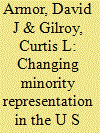| Srl | Item |
| 1 |
ID:
094136


|
|
|
|
|
| Publication |
2010.
|
| Summary/Abstract |
The Department of Defense has always sought a socially representative enlisted force, especially with respect to African American and Hispanic minorities. Ideally, in a democratic society a military force should be representative of the nation it defends. African American overrepresentation was a major concern during the first decade of the All-Volunteer Force (AVF), while Hispanics were underrepresented. During the 1980s black representation stabilized and Hispanics began to increase, especially with respect to enlistments. Starting in the 1990s, black representation began to decline, followed more recently by declines among Hispanics. This article examines changes in minority representation since the inception of the AVF in 1973 and argues that the wars in Afghanistan and Iraq have played a significant role in recent changes.
|
|
|
|
|
|
|
|
|
|
|
|
|
|
|
|
| 2 |
ID:
166594


|
|
|
|
|
| Summary/Abstract |
Latvia’s Russophones are often seen as a consolidated ethno-linguistic unit. The goal of this essay is to test this assumption by exploring Russophones’ in-group differentiation over an extended period of time. Conceptually, the essay combines social representation theory with the quadratic nexus model. By analysing cross-sectional survey data it is argued that citizenship of Latvia and generational belonging are two major factors that explain the deviation from the standard model of identification that is primarily imposed by Russia as a symbolic homeland. The essay also suggests that the standard model has experienced inconsistent support over the years and this has opened up space for identification with a more emancipated in-group representation.
|
|
|
|
|
|
|
|
|
|
|
|
|
|
|
|
| 3 |
ID:
098532


|
|
|
|
|
| Publication |
2010.
|
| Summary/Abstract |
The aim of this paper was to investigate public understanding of hydrogen energy using a particular social-psychological theory, namely, the theory of social representations to explore how processes of understanding generated lay knowledge of hydrogen energy. Using a free association method for data collection and multidimensional scaling for analysis, the results enabled the identification of themes in the data such as energy, environment, community, science, and technology, and people and place, around which understanding was based. Processes of representation, such as anchoring to pre-existing knowledge, were seen as essential in guiding understanding. The results indicated that there were diverse influences involved in understanding and, although risk perception of hydrogen was acknowledged, community concerns were seen to override any negative effect of focussing on risk. The role of emotion in decision-making was highlighted as positive emotional responses to the Promoting Unst's Renewable Energy (PURE), a local hydrogen storage project, resulted in hydrogen energy generally being positively evaluated despite acknowledged risks posed by hydrogen such as its explosiveness and flammability. Recommendations for policy include recognising that the combination of expert and lay knowledge plays an important role in public acceptance or rejection of hydrogen energy.
|
|
|
|
|
|
|
|
|
|
|
|
|
|
|
|